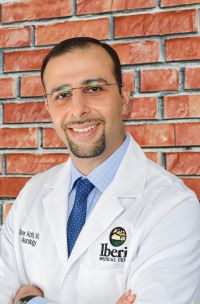May is ALS Awareness Month
POSTED: 5/24/2022

May is ALS Awareness Month
Also commonly called Lou Gehrig disease
This message about ALS is presented to you by the Iberia Medical Center Neurology clinic as May is ALS awareness month. We hope you find it helpful.
What is ALS?
Amyotrophic lateral sclerosis, or ALS for short, is the most common of several motor neuron diseases (MND). Humans have two types of motor neurons, or nerve cells: the upper and lower motor neuron. The upper motor neuron (UMN) resides in the motor division of the brain and connects it to the spinal cord and another brain structure referred to as the brainstem. The lower motor neuron (LMN) connects those respective structures to the limbs and appropriate muscles of the head and neck region. Motor neuron disease is a heterogenous group of disorders affecting the UMN in isolation (such as primary lateral sclerosis (PLS)), LMN in isolation (such as progressive muscular atrophy), or the combination of motor neurons as is the case with ALS.
ALS is also referred to as Lou Gehrig disease after the famous baseball player who was affected by this illness. It is an incurable progressive neurodegenerative disorder that primarily affects motor function. The relative lifetime risk of ALS in the United States is 1 in 350 for men and 1 in 400 for women. ALS incidence increases with age past the fourth decade with a peak incidence between 60-75 years. The lifetime expectancy varies based on the type of MND diagnosed and several other clinical factors.
Causes of ALS:
About 5-10% of ALS cases are inherited, meaning resulting from a mutated gene that is passed on generation to generation. The remaining 90-95% of cases are sporadic and occur as the result of a genetic predisposition (60% of sporadic cases) or certain exposures (40% of sporadic cases). There is an increased ALS risk association with military personnel, athletes of concussive sports (such as football and soccer), veterinarians, hairdressers, and plant operators. However, the exact causal mechanism is not well understood. The role of environmental factors such as heavy metal exposure and pesticide exposure remains controversial and unclear.
Diagnosis and symptoms of ALS:
ALS is diagnosed primarily on clinical grounds (meaning symptoms and exam findings in the appropriate patient demographic). However, several tools can confirm the diagnosis and aid in the diagnosis in unclear cases. These include but are not limited to electromyography and nerve conduction (the study of the muscle and nerve physiology) and genetic testing.
The symptoms of ALS are primarily motor in nature and vary based on which segment of the nervous system is involved. With involvement of the bulbar segment, symptoms typically include slurred speech, trouble swallowing, tongue weakness/wasting, weight loss, weak cough, drooling, and jaw clenching. With involvement of the spinal segments, one can expect weakness in the limbs, loss of muscle bulk, cramping, spasms, contractures, spontaneous twitching of the muscles, and pain secondary to increase muscle spasms. While ALS is primarily a motor neuron disease, variants can involve other aspects of the nervous system resulting in dementia/cognitive loss, depression, anxiety, emotional lability, and trouble sleeping.
Treatment of ALS:
The cornerstone in treating a patient with ALS is a multidisciplinary clinic consisting of a Neurologist, Pulmonologist, case manager, physical therapist, occupational therapist, speech therapist, and Neuropsychologist. While there is no cure to date for this unfortunate ailment, there are two FDA approved medications currently in use to reduce oxidative damage of the motor neuron. Rizulole (also known as Riultek) taken orally and Edaravone (also known as Radicava) taken intravenously. While these medications can contribute to slowing of disease progression and functional impairment, they sadly do not completely halt it. Otherwise, the treatment of ALS includes treatment of its symptoms such as depression, spasticity, cramps, and drooling as well as respiratory support with both invasive and non-invasive means.
For readers diagnosed with ALS or aware of persons with ALS, please visit www.ALS.org for additional patient resources and reading material.
Oliver Achi, MD
Medical Director of the Neurology Services
Iberia Medical Center
